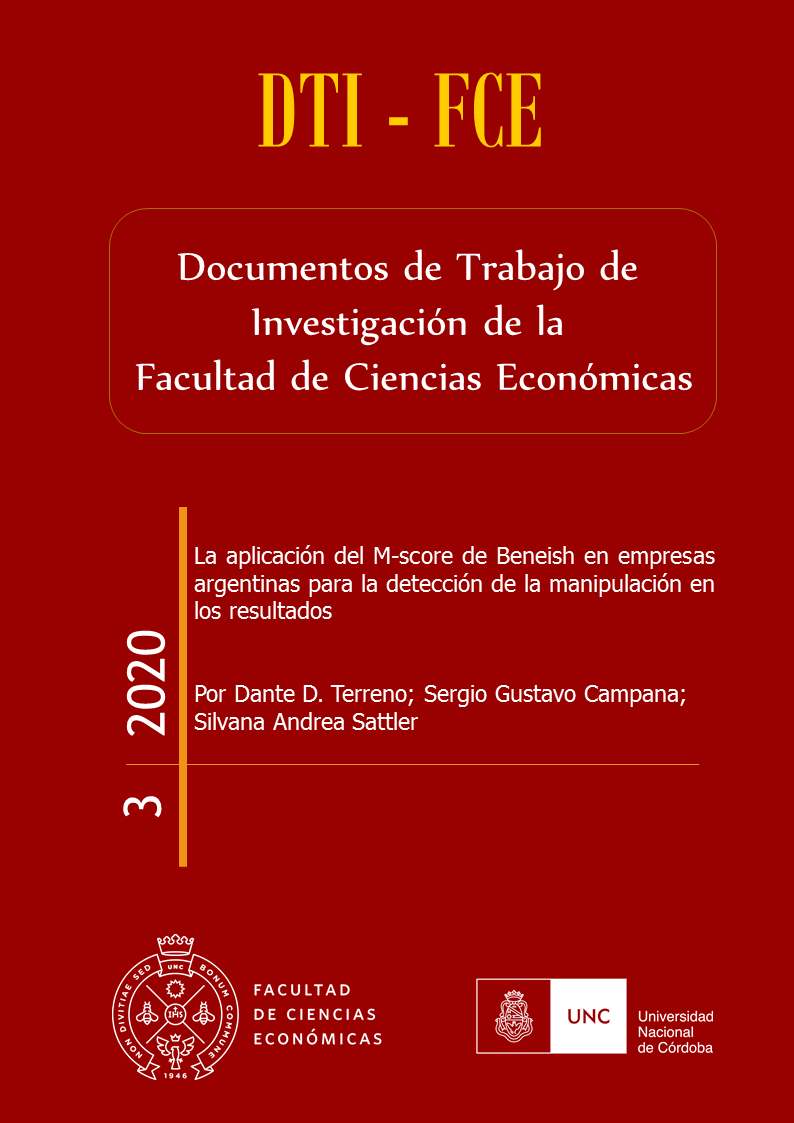La aplicación del M-score de Beneish en empresas argentinas para la detección de la manipulación en los resultados
Palabras clave:
Manipulación de resultados, Ajustes por devengo, Estados financierosResumen
Los estados financieros engaños o fraudulentos pueden causar un importante perjuicio económico a los usuarios de la información financiera. Beneish (1999b) ha desarrollado un M-score basado en un conjunto de ratios contables con el objeto de detectar aquellas empresas que manipulan sus resultados. El objetivo del este trabajo es efectuar un estudio descriptivo de la aplicación de M-score de Beneish en empresas argentinas y establecer un perfil de estas. Las conclusiones indican que el mayor porcentaje de potenciales manipuladores corresponde a las empresas afiliadas (46,67%). En segundo lugar, las empresas del Panel de Pymes (33,33%) y, por último, las que cotizan sus acciones en el Panel General (13,33%). Los valores asumidos por los índices del modelo permiten deducir, en general, el siguiente esquema de manipulación, las ventas son infladas por operaciones ficticias a crédito (o no realizadas), produciendo un aumento de margen bruto y del rubro créditos por ventas, lo cual lleva a mayores ajustes por devengo. También, puede incrementarse el margen bruto por la contabilización de inventarios ficticios que implica ajustes por devengo superiores.
Descargas
Referencias
Altman, E. I., 1968. Financial ratios, discriminant analysis and the prediction of corporate bankruptcy. The journal of finance, 23(4), pp. 589-609.
Bao, Y., Ke, B., Li, B., Yu, Y. J., & Zhang, J., 2019. Detecting Accounting Fraud in Publicly Traded US Firms Using a Machine Learning Approach. Obtenido de https://papers.ssrn.com /sol3/papers.cfm?abstract_id=2670703
Beneish, M. D., 1997. Detecting GAAP Violation: Implications for Assessing Earnings Management among Firms with Extreme Financial Performance, Journal of Accounting and Public Policy, 16(3), pp. 271-309.
Beneish, M. D., 1999a. Incentives and penalties related to earnings overstatements that violate GAAP. The Accounting Review, 74(4), pp. 5-457.
Beneish, M. D., 1999b. The detection of earnings manipulation. Financial Analysts Journal, 55(5), pp. 24-36.
Beneish, M. D., Lee, C. M., & Nichols, D. C., 2013. Earnings manipulation and expected returns. Financial Analysts Journal, 69(2), pp. 57-82.
Beneish, M. D., & Vorst, P., 2020. The cost of fraud prediction errors. Obtenido de https://papers.ssrn.com/sol3/papers.cfm?abstract_id=3529662
Cecchini, M., Aytug, H., Koehler, G. J., & Pathak, P., 2010. Detecting management fraud in public companies. Management Science, 56(7), pp. 1146-1160.
Cressey, D. R., 1953. Other people’s money: a study in the social psychology of embezzlement. Glencoe, IL: The Free Press
DeAngelo, L. E., 1986. Accounting numbers as market valuation substitutes: A study of management buyouts of public stockholders. Accounting review, pp. 400-420.
Dechow, P. M., Sloan, R. G., & Sweeney, A. P., 1995. Detecting earnings management. Accounting review, pp. 193-225.
Dechow, P. M., Ge, W., Larson, C. R., & Sloan, R. G., 2011. Predicting material accounting misstatements. Contemporary accounting research, 28(1), pp. 17-82.
Dechow, P. M., & Skinner, D. J., 2000. Earnings management: Reconciling the views of accounting academics, practitioners, and regulators. Accounting horizons, 14(2), pp. 235-250.
Dechow, P. M., Sloan, R. G., & Sweeney, A. P., 1995. Detecting earnings management. Accounting review, pp. 193-225.
Healy, P., 1985. The impact of bonus schemes on the selection of accounting principles. Journal of Accounting and Economics, 7(1-3), pp. 85-107.
Healey, P., & Wahlen, J., 1999. A review of the earnings management literature and its implicatións for standard setting, Accounting Horizons, 13(4), pp. 365-383.
Jones, J. J., 1991. Earnings management during import relief investigations. Journal of accounting research, 29(2), pp. 193-228.
Magrath, L., & Weld, L. G., 2002. Abusive earnings management and early warning signs. CPA journal, 72(8), pp. 50-54.
Morris, G. D. L., 2009. Enron 101: how a group of business students sold Enron a year before the collapse. Financial History, (94), pp. 12-15.
Schipper, K., 1989. Earnings management. Accounting horizons, 3(4), pp. 91.
Terreno, D. D., & Sattler, S. A., 2015. Estudio comparativo de la estructura de financiación de las empresas del Panel Pymes con las del Panel General-Mercado de Valores de Argentina. Gestión Joven, 13, pp. 55-71.
Wahlen, J. M., Baginski, S. P., & Bradshaw, M. T., 2011. Financial reporting, financial statement analysis and valuation: A strategic perspective (7e Ed), South-Western, Cengage Learning.
Zimmerman, J. L., 2015. The role of accounting in the twenty-first century firm. Accounting and Business Research, 45(4), pp. 485-509.
Archivos adicionales
Publicado
Número
Sección
Licencia
Derechos de autor 2020 Documentos de Trabajo de Investigación de la Facultad de Ciencias Económicas (DTI-FCE)

Esta obra está bajo una licencia internacional Creative Commons Atribución-NoComercial-SinDerivadas 4.0.






